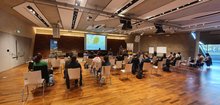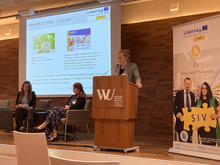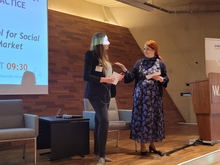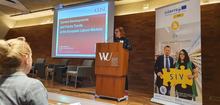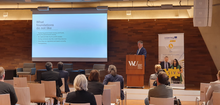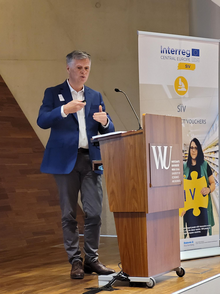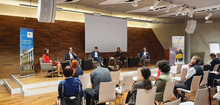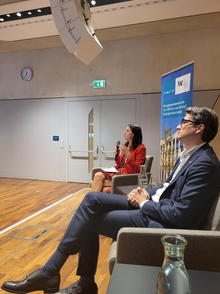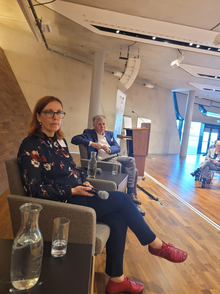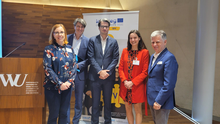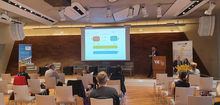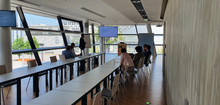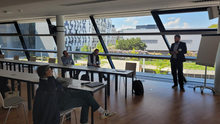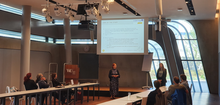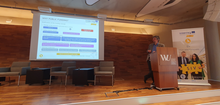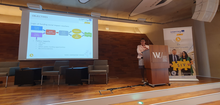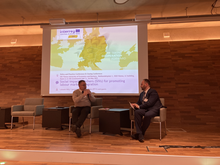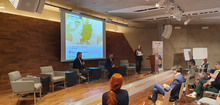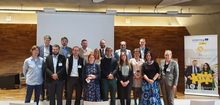Conference "Social Impact Vouchers as a Tool for Social Innovation on the Labour Market"
Policy & Practice Conference
![[Translate to English:] Project logo Interreg SIV](/fileadmin/wu/_processed_/e/8/csm_Interreg_SIV_fc5746d3fc.jpg)
Date: 03 May 2022, 9.30 am - 4 pm
Location: WU Vienna, LC.0.100 (Ceremonial Hall 1), LC Building + livestream
What role can private donors play in the fight against unemployment? This question was the focus of the Policy & Practice Conference at WU Vienna on May 03, 2022. The conference marked the conclusion of the Interreg project "Social Impact Vouchers" (SIV). Within the framework of the project, eleven partners from eight Central European countries have developed voucher models for different vulnerable groups affected by unemployment over the last three years and tried to find private donors to participate in the funding. The conference served to present results and experiences and to reflect on them together with various experts.
Marta Kahancová, Executive Director of the Central Europe Labour Studies Institute (CELSI) highlighted societal developments that pose major challenges for the European labour market in her presentation. These are for instance aging, structural shifts in the labour market due to digitalization and the greening of the economy, migration and integration especially in the wake of refugee movements, as well as the risk of poverty, which is currently strongly exacerbated by inflation and rising energy prices. Vulnerability occurs along various socio-demographic characteristics (women, elderly, youth, etc.), but is also influenced by the type of connection to the labour market (e.g. self-employment, people with multiple employment contracts). Addressing the consequences of these developments requires innovative approaches, the interaction of all stakeholders involved and clear policy frameworks.
In his presentation, Michael Fembek, head of the Zero Project founded by the Essl Foundation, described experiences with promoting the employment of people with disabilities and questioned - quite critically - the role that private non-profit foundations can play there. The Zero Project is making a significant contribution to strengthening the ecosystem around the topic of employment for people with disabilities internationally, as he impressively demonstrated with a number of innovative examples. However, if one looks at the amount of financial resources behind it, it becomes clear that these are very small in relation to public funding. The decisive factor, however, is cooperation, because it is not a matter of substituting public measures, but of finding innovative approaches. Foundations could make a significant contribution where it was a matter of trying out new things, even at the risk of failure. As an example, he mentioned the Social Impact Bond, which was carried out for the first time in Austria in 2015 for the benefit of the Violence Protection Center Upper Austria, Women's Shelter Linz.
In the panel discussion that followed, Christian Grünhaus, scientific director of the NPO Competence Center at WU Vienna, invited the two above mentioned speakers as well as Iva Tsolova, co-founder of the social enterprise JAMBA as well as Julian Hiebl, responsible for international affairs at AMS, to delve deeper into the topic. Iva Tsolova described how COVID-19 helped convert their IT training program for people with disabilities/chronic illnesses to an online format, which allowed the program to scale significantly and is now available to many more affected individuals. Julian Hiebl reported on the European Network of Public Employment Services (PES), which is committed to an intensive exchange with the clear aim of improving the quality of employment services in the individual countries. In the discussion, the importance of cooperation between public and private stakeholders to address the challenges in the labour market was once again emphasized.
In the afternoon, the partners presented the SIV project in three breakout sessions. One of them dealt with the voucher models in the participating countries. Voucher benefits include training, placement assistance or finance labour costs for a specific period. In a second breakout session, fund models were presented. In addition to public funds, the partners primarily addressed philanthropic donors. The models do not provide monetary returns to funders, but portions of the funds used are intended to be returned to the funds through success fees. The third breakout session focused on impact measurement. In the course of the project, the NPO Competence Center conducted a Social Return on Investment (SROI) analysis for a project partner (Diakonie Württemberg), where the church has been funding vouchers for long-term unemployed persons over several years. The approach of the impact analysis as well as results were presented. Furthermore, it was discussed to what extent the results of the SROI analysis were used and where they were helpful.
Finally, the project partners presented important lessons learned and recommendations for action. In the participating countries, the fight against unemployment is very much perceived as a task of the state. So far, there are hardly any business models that make this topic interesting for impact investors. The first steps in this regard are social impact bonds. Attracting philanthropic donors, on the other hand, requires a lot of relationship building, which was very difficult during the COVID-19 phase due to the many restrictions. Legal hurdles were also evident in the establishment of a transnational fund, in part because the tax framework for cross-border donations is not yet well regulated. In view of developments in the labour market and associated social challenges, it is necessary for private and public stakeholders to cooperate and develop innovative solutions in order to continue to combat poverty and exclusion in the future.
The conference sessions as videos
Conference Opening
Keynote 1 (Marta Kahancová)
Keynote 2 (Michael Fembek)
Conference impressions
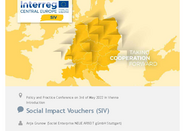
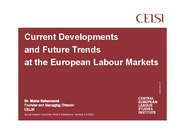
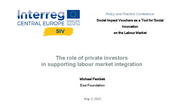
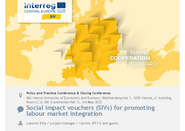
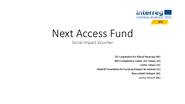
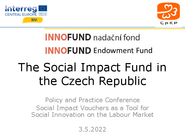
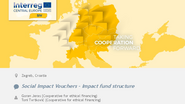
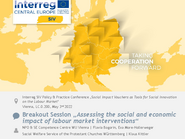
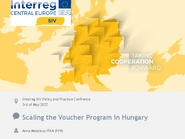
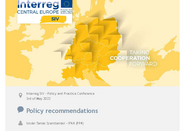
Conference Speakers & moderation
Ľubomír Billý
![[Translate to English:] Lubomir Billy](/fileadmin/wu/_processed_/6/1/csm_Lubomir_Billy_b06e59774c.jpg)
Ľubomír Billý is a graduate of master and doctoral studies at the University of Economics in Bratislava. During his doctoral studies, he was involved in the implementation of projects in the field of regional development and migration. Since 2012, he has worked at the consulting, research and education company Centire. As part of his work as a senior consultant, he is in charge of the preparation and implementation of projects financed from local, national and especially international sources.
Flavia-Elvira Bogorin
![[Translate to English:] Flavia Bogorin](/fileadmin/wu/_processed_/0/8/csm_Bogorin_Flavia_225ded5a0b.jpg)
Flavia-Elvira Bogorin has been a researcher at the Competence Center for Nonprofit Organisations and Social Entrepreneurship since 2016. In the course of her previous work, she has participated in research projects and studies with different focus areas, especially impact measurement, evaluation and research-based support of NPOs and social businesses as well as of programmes and measures of the public sector. Her current research interests include the topics of youth and family, health promotion and prevention, volunteering and civil society as well as labour market integration and elderly care. Currently, she is working in the EU-project Interreg SIV (Social Impact Voucher) for the promotion of labour market integration of the long-term unemployed in Central Europe. Flavia completed her master's degree in socioeconomics at WU Vienna. Before that, she studied political science at the University of Vienna on the bachelor level.
Michael Fembek
![[Translate to English:] Michael Fembek](/fileadmin/wu/_processed_/6/d/csm_Michael_Fembek_ZP_5817594984.png)
After graduating from the Vienna University of Economics, Michael Fembek (born 1961) joined GEWINN, an Austrian business magazine, serving between 2000 and 2007 as editor-in-chief. In 2009, he initiated “Sinnstifter”, a project by Austrian philanthropists, and launched the annual Austrian CSR-Guide on corporate responsibility. In 2010, he joined the Essl Foundation as Programme Manager and – until 2014 - the bauMax group as its Head of Social Affairs. Since 2011, he is the Director of the Zero Project, a project of the Essl Foundation, and organizes the annual Zero Project Conference in the UN Headquarters in Vienna. In 2014, he co-initiated the Verband für Gemeinnütziges Stiften, the Austrian Philanthropic Association, where he serves as Member of the Board. In 2015, he became the Chair of the Thematic Group on Disabilities within the European Foundation Centre (EFC). In 2016, he co-initiated the House of Philanthropy in Vienna and, in 2019, the Sinnbildungsstiftung, a foundation focusing on innovations in education where he now serves as a Board Member.
Clemens Foschi
![[Translate to English:] Clemens Foschi](/fileadmin/wu/_processed_/e/7/csm_Clemens_Foschi_32de3eefca.jpg)
Clemens Foschi has been heading the Coordination Office for Cooperation and Civil Society at Caritas Vienna since 2015. He was previously the managing director of magdas, the social business subsidiary of Caritas Vienna, where he was responsible for the development of magdas Hotel, among other things. Clemens Foschi studied commercial science.
Anja Grunow
![[Translate to English:] Anja Grunow](/fileadmin/wu/_processed_/0/2/csm_Anja_Grunow_9e3d972c3e.jpg)
Anja Grunow, born in Stuttgart, has been a project manager at the lead partner Social Enterprise Neue Arbeit in the Interreg project Social Impact Vouchers since 2019. She has more than 15 years of experience in the field of labour market integration with different target groups such as (long-term) unemployed, people with disabilities, young and older people, migrants as well as single mothers and fathers. Also, in combination with modern learning tools such as modular learning, especially in the field of business. Since 2007, she has been successfully bringing people back into the labour market, with high ranking results, by working for various renowned organisations active in this area, such as Dekra Akademie, Deutsches Erwachsenen-Bildungswerk, Diakonie Stetten e.V. and since 2012 for the Social Enterprise Neue Arbeit. Prior to that, she worked from 1997 for several years in the media sector as a project manager in the Holtzbrinck publishing group. She also gained international experience at Mercedes Benz in France and in Canada and worked as a manager in South East Asia. She graduated a study in Business Administration (BA) in Commerce in 1992.. In 2005, she obtained the International Management Diploma and in 2007 the Master of Business Management (SMP) in the St. Gallen Management Programme and between 2010-2012 several SAP consultant degrees.
Christian Grünhaus
![[Translate to English:] Christian Grünhaus](/fileadmin/wu/_processed_/a/2/csm_Christian_Gr%C3%BCnhaus_Jun21_e6db7dc650.jpg)
Christian Grünhaus (formerly Schober) is senior researcher and the academic director of the Competence Center for Nonprofit Organizations and Social Entrepreneurship at WU Vienna. For many years, he has been leading applied research projects on NPOs and in the social sector. He is a member of the scientific advisory board of VÖWG and of CIREC AT. His current research interests are in the field of financing and governance of non-profit organizations as well as the (economic) evaluation and impact assessment of organizations, projects and programs with a focus on social added value. Methods of social impact measurement and especially SROI-analyses play an important role here. Topics in the field of elderly care and services for people with disabilities are also part of his work and publication activities.
Julian Hiebl
![[Translate to English:] Julian Hiebl](/fileadmin/wu/_processed_/7/b/csm_Julian_Hiebl_b82f905b5d.png)
Julian Hiebl manages international relations at the Austrian public employment services (AMS), which also currently chairs the European Network of Public Employment Services. He has a master in political sciences and history from the University of Vienna and has been working in the context of labour market policy for more than 15 years in Austria and Brussels.
Goran Jeras
![[Translate to English:] Goran Jeras](/fileadmin/wu/_processed_/7/4/csm_Goran_Jeras_a79d1d5c28.jpg)
Goran Jeras has been the manager and CEO of the Cooperative for Ethical Financing in Zagreb since its foundation in 2014. Within this role, he also founded the first ethical bank in Croatia. Previously, he has worked as chief product manager for Cloudbilling BV and as a senior consultant specialized on process optimization and strategic consulting for Yellowtail BV in the Netherlands. Other notable achievements are his memberships in various governmental commissions and advisory boards in Croatia and Slovenia since 2005 or in the European Commission Expert Group on Social Economy (GECES) between 2015 and 2018. Since 2016, Goran is also a Marshall Memorial Fellow for the German Marshall Fund of United States. Goran graduated in 2006 with a bachelor degree in experimental physics from the University of Zagreb.
Marta Kahancová
![[Translate to English:] Marta Kavancova](/fileadmin/wu/_processed_/a/c/csm_Marta_Kavancova_ae5d9b5d24.png)
Marta Kahancová is Founder and Managing Director of the Central European Labour Studies Institute in Bratislava, Slovakia. Her research interests are in the Sociology of Organizations and Work; in particular, she studies working conditions, industrial relations, and atypical forms of work. She also serves as a labour market expert in projects commissioned by the European Commission and the European Labour Authority. Her publications appeared in international peer-reviewed journals in Industrial Relations, Sociology and Human Resource Management.
Klaus Kittler
![[Translate to English:] Klaus Kittler](/fileadmin/wu/_processed_/5/0/csm_Klaus_Kittler_d6bc9dd5ad.jpg)
Klaus Kittler worked as a consultant at Diakonie Württemberg until 2019 and was responsible, among other things, for the area of unemployment assistance. He is involved in the Interreg-SIV project as a technical advisor.
Anna Mészáros
![[Translate to English:] Anna Mészáros](/fileadmin/wu/_processed_/5/c/csm_Anna_M%C3%A9sz%C3%A1ros_300x300_ebea4cddad.png)
Anna Mészáros is an international project manager and social enterprise expert at IFKA Public Benefit Non-profit Ltd. She has managed successfully Interreg projects targeting Social Enterprise development and financing. She has participated as an expert for financing in the SIV project. She has got long time experience in fund management, in trading securities and banking. Based on her experiences, she volunteered as the member of the business advisory team for social enterprise development at NesSt and gained experience in social econonomy by “learning by doing”. After the carrier in the financial sector she worked at several Hungarian non-profit organizations. With this good combination of experiences in the business and non-profit sectors, she has joined IFKA four years ago as a SE business developer, and has become an international project manager two years later.
Eva More-Hollerweger
![[Translate to English:] Eva More-Hollerweger](/fileadmin/wu/_processed_/8/c/csm_More-Hollerweger_Eva_00532c7b54.jpg)
Eva More-Hollerweger is a senior researcher and head of the area “Non-profit Organizations and Civil Society” as well as chairwoman of the npoAustria association. For many years, she has been working from a business and economic perspective on topics related to volunteering and a wide variety of topics relevant to the NPO sector. Eva studied business administration at the WU Vienna, with a thematic focus on management, marketing, environmental economics and non-profit research. Besides numerous lectures and publications on these topics, she has contributed as an author to the publication of the reports of the Ministry of Social Affairs on voluntary engagement in Austria and to the Civil Society Index.
Saša Perčič
![[Translate to English:] Saša Perčič](/fileadmin/wu/_processed_/2/8/csm_Sa%C5%A1a_Per%C4%8Di%C4%8D_214233b96b.jpg)
Saša Perčič has a lot of experience in the field of economics. Her career started at Dun & Bradstreet in Slovenia as an analyst, continued in the retail services sector for more than 20 years and in 2019 joined Fund 05, a private financial institution established to finance social entrepreneurship and social innovation in Slovenia, as a project coordinator. She has a master degree in economics and in last 6 years has been active also at the field of education with tutoring and conducting workshops for students in Slovenia.
Stefan Schöggl
![[Translate to English:] Stefan Schöggl](/fileadmin/wu/_processed_/6/6/csm_Stefan_Schoeggl_alt_4a24a1429f.jpg)
Stefan Schöggl joined the Competence Center for Nonprofit Organizations and Social Entrepreneurship as a student assistant in July 2021. He is primarily involved in the EU-project Interreg SIV (Social Impact Voucher), which aims to promote the labour market integration of the long-term unemployed in Central Europe. He studies at the BOKU University of Natural Resources and Life Sciences in the bio-resource management masters programme, after having previously completed the eponymous bachelors programme. He thus brings with him a broad spectrum of knowledge. In his studies, he works, among other things, on the topics of innovation and sustainability in all their dimensions.
Eva Škrabalová
![[Translate to English:] Eva Škrabalová](/fileadmin/wu/_processed_/8/9/csm_Eva_%C5%A0krabalov%C3%A1_36423f22d9.jpg)
Eva Škrabalová has been working as a Senior Expert Project Manager, Consultant and Coordinator of Foreign Cooperation at the Center for Community Organizing North Moravia and the BEC - Business and Employment Cooperative in Šumperk since 2014. Eva is responsible for the implementation of EU socially-oriented projects focused on active policy of employment (business and employment support), equal opportunities (women 50+, women on maternity leave). Her activities within the framework of these projects include organizing training courses in the field of public participation/relations and information campaigns. Since her graduation at the University of Economics in Prague with the major specialization in Public Administration and Regional Development and the minor specialization in European Integration, she gathered wide experience in local and regional development, public participation and international cooperation. She was involved in the establishment and development of the Center for Community Organizing in Central Bohemia. She is an initiator and co-founder of the Vikýrek Family Center in Vikýřovice and was actively involved in its development as a statutory representative and chairman from 2008 to 2014. She worked for 3 years as a Citizen Participation Short-Term Adviser in the Serbian Local Government Reform Program (SLGRP) in Serbia - a program funded by USAID.
Ivo Škrabal
![[Translate to English:] Ivo Škrabal](/fileadmin/wu/_processed_/5/8/csm_Ivo_Skrabal_4e9efa7e49.jpg)
Ivo Škrabal‘s entire professional career has been more or less related to the issue of community development. During his studies at the University of Ostrava, he started working with disadvantaged groups - in a community-based way, with the aim of activating them and thus jointly developing solutions for local issues. Later, he focused on rural development issues. From these activities, he gained a lot of experience in initiating the establishment of local partnerships in rural areas through the application of the Leader method. Some examples are the establishment of Local Action Groups Moštěnka, Mohelnicko and JEMAS - Jeseník, whose main objectives and missions are to coordinate the sustainable development of local communities. In the last years, in connection with previous experiences as well as with the impact of the economic crisis in rural areas, he is focusing on finding "new" solutions to unemployment and stopping the so-called "brain drain" syndrome. He is working on this especially by applying the innovative method of BEC - Business and Employment Co-operative Initiatives, based on the support (self-employment) of people disadvantaged on the labour market, and the principles of social economy and social entrepreneurship.
István Tamás Szenttamási
![[Translate to English:] István Tamás Szenttamási](/fileadmin/wu/_processed_/8/9/csm_Szenttamasi_64065b711e.jpg)
István Tamás Szenttamási is an international project manager and social enterprise expert at IFKA Public Benefit Non-profit Ltd., where he is responsible for the SIV project and for the design and implementation of other international projects targeting the areas of social entrepreneurship, social innovation and employment. As a cultural anthropology graduate, he has been always interested in the border areas of social issues, economics and employment. Therefore, his attention turned towards social economy and social entrepreneurship early, and he has been contributing to the development of the Hungarian social enterprise sector as an expert of private consulting companies as well as governmental agencies including OFA National Employment Public Benefit Non-profit Ltd. and IFKA.
Pétur Thorsteinsson
![[Translate to English:] Pétur Thorsteinsson](/fileadmin/wu/_processed_/c/1/csm_Petur_Thorsteinsson_e135c0295e.jpg)
Deacon Pétur Thorsteinsson (M.A. European Studies) is the Managing Director of Hope for Eastern Europe, an action of the Evangelical Church in Württemberg and its Diaconia. As an expert in the Department of Migration and International Diaconia, he is also responsible for coordinating the involvement of the Diaconie Württemberg, in particular the Department of Livelihoods, in the Interreg project "Social Impact Voucher". Born in Iceland and resident today in Germany, he brings 25 years of experience in diaconal and church work in Iceland and Germany, especially with a focus on international youth work, transnational ecumenical exchange and interfaith dialogue. As a Trainer for European Youth Projects and external evaluator for various EU funding projects, his focus has been on project management, empowerment, resource and skills development of young people and volunteers.
Iva Tsolova
![[Translate to English:] Iva Tsolova](/fileadmin/wu/_processed_/1/d/csm_Iva-Tsolova-Photo_fd381a91e3.jpeg)
Iva Tsolova is a human rights activist, social entrepreneur and the Co-Founder of JAMBA - Career For All, whose mission is to support people with disabilities and chronic illnesses to attain key soft and professional skills in the ICT & AI fields. As a follow-up step, JAMBA acts as a bridge between talents and employers so that way they begin their professional development and find an inclusive, flexible and secure digital job. Iva is an expert for small enterprises and businesses with multiannual experience. Her focus is business development and creation of long-term values of the organisation. During the 13 years of work in the NGO sector, she supported many local and international organizations. She was Bulgarian Youth Delegate to the United Nations and to the Council of Europe. Iva has been awarded for The Outstanding Young Persons in Bulgaria for 2016 in Humanitarian and Volunteerism Leadership, and also was one of the “30 under 30” of Forbes Europe in 2018 in the category “Social Entrepreneurship”. She holds a bachelor's degree in International Relations and Politics from University of National and World Economy, Bulgaria. Mrs. Tsolova is a graduate of the America for Bulgaria Foundation and its entrepreneurship program at Babson College, Boston, USA. She has long experience working with people with diverse abilities, refugees and other vulnerable groups on local, national and international level.

